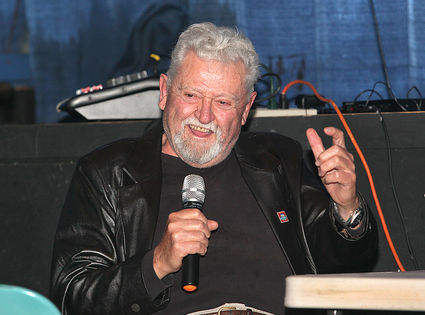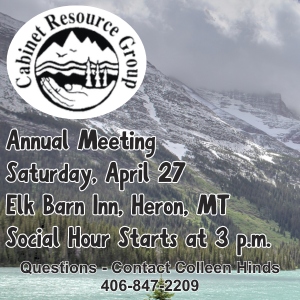Hospital's first staff look back
October 3, 2019

Ed Moreth
THE OLD DAYS – Dr. Jack Lulack tells how he caught a newborn stuck in the back seat of a pickup truck in his early days at the Rittenour Clinic.
The 50th anniversary of the Clark Fork Valley Hospital is two years away, but last week community members in Plains had the opportunity to hear stories from some of the hospital's first doctors and nurses.
Twenty-three people showed up at the Llano Theatre last Thursday to listen to Drs. Jack Lulack and John Drye, and Registered Nurses Doris Larson and Betty Boehler, who for more than an hour gave some insight on how the hospital got started and talked about some of the unique work problems of the early days. Bruce Icenoggle, who worked at the hospital, first as a lab technician in 1972 and as the hospital CEO in 1977, served as moderator for the evening.
"We're focusing on four of our original employees when the hospital opened in 1971 that lived through the development of the hospital and those first few years that they operated. We thought it would be interesting for people to hear how things have changed and what were some of the challenges," said Barry Fowler, the hospital's director of Human and System Resources.
Clark Fork Valley Hospital opened its doors in January 1971, but the story of its start began shortly after Lulack and Drye arrived in Plains four years earlier. The two had gone to medical school together at the University of Wisconsin and talked about practicing in a small town. Lulack and his wife, Louise, toured about a dozen communities in Wyoming, Idaho, Montana, and Oregon in the mid '60s. He was doing his residency in Vermont when he got a call asking about practicing in Sanders County. Drye was at Denver General Hospital when he received a call from Lulack about working in Plains. "We were looking for a small place out here that we could build a practice," said Lulack.
"These people had a huge impact on this community and we are where we are today because of their insight, their forward thinking and their dedication," said Fowler, also the executive director of the Clark Fork Valley Hospital Foundation, a nonprofit organization that helps purchase equipment not in the hospital's regular budget. "We know from experience that this hospital never would have happened without John Drye and Jack Lulack, both physicians of great esteem in my opinion," said Icenoggle.
The two doctors arrived in 1967 and started their practice at what came to be known as the Rittenour Clinic, now home of the Little Bitterroot Services near the bridge to the fairgrounds. They traveled to the Sanders County Hospital in Hot Springs on a daily basis to make patient rounds or to perform surgery. Drye said Lulack did most of the baby deliveries, including one on a picnic table at Rainbow Lake.
Lulack told the story of a baby born one winter in a pickup truck in the clinic parking lot. He saw the pickup arrive and went out to check on them, but when he got to the truck the mother said the baby was born and she didn't know where it was.
"I found the baby down between the door and the seat, so I tried to extract the child and he was slippery and slimy and I couldn't get him out. There was no getting that baby out of there. I can remember I'm laying on the ground underneath the door and I'm having him open up the door and I caught the baby. I think that was the first indication that we needed a hospital in Plains," said Lulack, 84, who retired from Clark Fork Valley Hospital in 1991.
Lulack and Drye were both discouraged with the Hot Springs hospital. Drye said prominent Plains residents Millar Bryce and Alice Diehl spearheaded the building of a Plains hospital. Plans started around 1969. Their loan was initially rejected, said Lulack, who had planned to see President Richard Nixon to get the loan approved, but before he headed to Washington, D.C., a Nixon aide called to find out why he wanted to meet with the president. A short time later, he called back to let them know the loan went through. Eventually, a loan of $900,000 was obtained, but it was short of the $1.4-million needed. Dryer said that community members bought shares, but it was still short. He said an anonymous donor came up with $100,000 to meet their goal.
Drye said that it was a lot of work with a long hours at first. They were the only two doctors and they worked seven days a week and when one went on vacation, the other had to fill in. Clark Fork Valley Hospital opened with a staff of 45 and sometimes the staff had to improvise. When a doctor in Hot Springs refused to do radiologist work at the Plains hospital, Lulack went to school in Oregon to learn how to do it. There was no ambulance service when the hospital started. Clint Spindler bought an ambulance, but to save a doctor from having to accompany the ambulance to Missoula, Lulack gave the first EMT classes.
Even with long hours and the need for equipment, Drye said he loved the work and felt welcomed by the community. "The people of Sanders County and a lot of people from Mineral County really treated us good," said 81-year-old Drye, who still practices by working two days a week at the hospital's clinic in Hot Springs. He said the biggest change over the years was the technological advances, which helped doctors detect problems faster and more efficiently.
Larson, 89, worked at the Sanders County Hospital in 1958 after receiving her nursing degree from St. Luke's Hospital in Fargo, North Dakota. Later, she worked with Drye and Lulack at the clinic and started at Clark Fork Valley Hospital when it opened. She grew up in North Dakota and moved to Plains in 1956, when her husband, Jerry, got a music teaching job at Plains High School. As a nurse, she worked in a variety of capacities, such as obstetrics, surgery, emergency room, acute care and the nursing home. She gave nursing classes, taught CPR and started the candy striper program at Clark Fork Valley Hospital. She retired in 1980.
The 89-year-old Boehler is the only one in the group who was raised in Sanders County, growing up in Trout Creek before moving to Plains. She received her nursing degree from the Deaconess Hospital School of Nursing in 1963. She worked for one year at the Sanders County Hospital, but she said they didn't have updated equipment or a progressive administrator.
She said that at Clark Fork Valley Hospital the hours were long, but she enjoyed the work. She retired in 1996. She said she was tired, but after six months she was ready to go back to work.
"I think the thing you could say about Clark Fork Valley Hospital is that you could make progress here," said Lulack, "which was something that just didn't seem to be happening with the system that was here when we came. There was no ability to make progress in the science of medicine. Look at the hospital you have today. It's almost unbelievable for a little town like Plains, Montana."
Clark Fork Valley Hospital has grown significantly over the years, adding a million dollar wing several years ago, putting in the long term care nursing home, and now boasting of 230 employees, possibly the largest employer in Sanders County. Fowler said the hospital also has around 30 volunteers, who put in about 80 hours a month. He said volunteers are instrumental to the hospital operation, something that dates to the start.
"To try to place a number on the total number of volunteers over the years is difficult because the very nature of communities and across the county and across the state is people respond when there's a need," said Fowler. "They respond with time, they respond with funds, and they support it in a variety of ways. We've had a loyal group of people come regularly to the hospital and volunteer to cut the hair of the long term care residents. We have people come to sing and come and share, and we've had people come and knit caps and donate clothing. The volunteers are many," he said.
Financial aid to the hospital isn't a new concept. Drye said he believes some of the people who put up funds to get the hospital started never asked to get their money back. Fowler said community members continue to show their generosity. Since January, people have donated $51,000. Fowler is also the executive director for the Clark Fork Valley Hospital Foundation. He said the foundation has raised over $300,000 for the hospital over the last 15 years.
Fowler also put in a plug for the Llano Theatre, which gave the hospital free use of the theater for the get together. The theater, owned by John and Eric Meckler, was out of commission for two weeks in August after having a major mechanical breakdown, which cost them almost $6,000, plus the lost revenue of being closed.







Reader Comments(0)